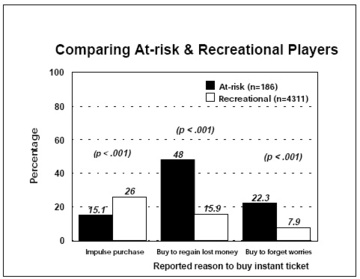The WAGER, Vol. 2(49) – Evaluating the impact of new Dutch instant lottery
The types of legal gambling available in the Netherlands are casinos, slot machines, lotto games, soccer pools, bingo, horse betting, “passive lotteries”, and prize contests. In 1994 the Dutch government supported the introduction of an instant lottery on the condition that an evaluation study be conducted within 2 years of start-up.* The evaluation’s objectives were to identify the extent of at-risk instant lottery players and the characteristics distinguishing at-risk players from recreational players. The researchers operationalized “at-risk playing” as 1) having bought at least 25 instant lottery tickets during the previous month, 2) meeting 1 of 5 measures of impaired control, and 3) meeting 1 of 6 measures on the presence of problems. The study authors pose that these three dimensions of at-risk or problem gambling (gambling behavior, impaired control, adverse consequences) may be consecutive phases, though overlapping, in the development of problem gambling. Vendors who sold instant lottery tickets were randomly selected for this study; 6155 buyers were approached and asked to participate in the study. Of these buyers, 4497 (73.1%) completed the interview. Four percent (4.1%) met the criteria for “at-risk players”. The most prevalent measure of impaired control was “spending too much money on instant tickets”; the most prevalent measure of adverse consequences was “financial problems due to the instant lottery”. Comparisons between at-risk players and recreational players (all non-at-risk players) revealed that a smaller percentage of at-risk players than recreational players reported purchasing instant lottery tickets impulsively. These comparisons also revealed that a significantly higher percentage of at-risk players purchased instant tickets to regain money that they had lost previously and to forget their worries for a moment. “Pathological gambling” is classified as an impulse control disorder in the American Psychiatric Association’s DSM-IV. Although this study uses different criteria than the DSM criteria, these data suggest that at-risk instant lottery players buy primarily for reasons other than impulsiveness. In addition, U.S. state governments planning to introduce a new gambling.
Source: *Hendriks, V.M., Meerkerk, G.-J., Van Oers, H.A.M., & Garretsen, H.F.L. (1997). The Dutch instant lottery: Prevalence and correlates of at-risk playing. Addiction, 92(3), 335-346.
Percentage
This public education project is funded, in part, by The Andrews Foundation.
